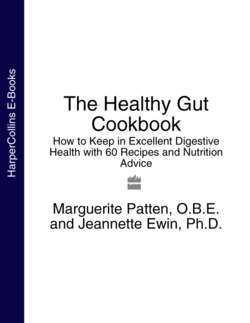Читать книгу The Healthy Gut Cookbook: How to Keep in Excellent Digestive Health with 60 Recipes and Nutrition Advice - Marguerite Patten - Страница 25
the ageing gut
ОглавлениеPassing years affect the way we look and feel. Our skin changes, we tend to feel less energetic, and we suffer more from niggling aches and pains due to wear and tear on joints and muscles. To fight off the years, we may try a new face cream, join a gym or start a diet designed to correct whatever we feel affects us most. We worry about our hearts, our brains, our muscles and our bones. And yet, as strange as it may seem, very few of us stop to worry about our ageing digestive system. We fail to recognize that caring for this part of our body can not only improve the way we feel, but – best of all – increase the likelihood we will live longer, healthier lives. Here are just a few ways ageing – and our behaviour as we age – affects our digestive system.
• Lost teeth and poorly fitted dentures can interfere with chewing. This makes it less likely that food will be crushed and mixed before reaching the stomach, thus slowing digestion.
• Many people avoid fresh fruits, such as apples, and nuts because they are hard to chew, missing out on needed vitamins, minerals and fibre.
• Meat may become difficult to chew – or prepare – and appears less frequently on the table, potentially reducing the intake of protein and vitamin B12 below healthy limits.
• Older people tend to drink too little water, thus failing to provide the watery environment needed for digestion. (Those worried about bladder control frequently suffer from this problem.)
• The stomach produces less acid with age, reducing the ability to digest proteins.
• Fewer digestive enzymes and secretions are produced by the pancreas and gut.
• Health problems may increase the need for regular medication that may have side-effects, altering the gut (see Appendix Two).
• A poor appetite and decreased activity are associated with ageing. A lowered food intake means that the body has less chance of getting the nutrients it needs.
• Smoking and drinking alcohol are habits that may become stronger with age. Smoking is sure to damage health. Consumed beyond moderation, alcohol can impair mental and physical health.
• Many older people may suffer from low levels of vitamin D because they tend to stay indoors, thus getting little exposure to sunlight.
• Preparing food becomes a bother and there is greater reliance on ready meals, thus reducing the intake of fresh fruit and vegetables.
All these factors lead to poor nutrition. Scientific studies have shown that it is not uncommon for older people to consume less than their daily requirement of calcium, magnesium, zinc, folate, and vitamins B6, B12 and D. There is only one word to describe the consequences: malnutrition! The cost is high. Consider one fact: low levels of just one of the nutrients listed, vitamin B12, can lead to poor balance and coordination and memory lapses.
What can be done about this? The simple basics are:
• Stay physically active to work up a good appetite.
• Make an effort to eat fresh foods that are a natural source of the nutrients you need.
• Find a pleasant place to sit in the sun and let your body build up valuable levels of vitamin D, the sunshine vitamin.
• Drink plenty of water.
• Choose simple-to-digest forms of protein, such as meaty soups and consommés.
• Enjoy live yoghurt whenever possible, and eat fresh fruits and vegetables every day.
If you feel that this is not enough, talk to your local chemist or doctor about taking vitamin supplements. If you wear dentures, see your dentist and make certain they fit properly. Later chapters explain how choosing the right foods can help you maintain a healthy body – no matter what your age!
Remember: Medical evidence shows that older people who eat plenty of fruits and vegetables live longer, healthier lives.
